General Discussion
Related: Editorials & Other Articles, Issue Forums, Alliance Forums, Region ForumsWhy is it when the Banks ''get in trouble,'' the People bail them out?
Even when the Banks were looted by the executives running them, the People must bail them out.
Yet, when the People "get in trouble," the Banks are no where to be found?
Why must the people of Greece, Puerto Rico, Detroit and everywhere else suffer?
HFRN
(1,469 posts)hobbit709
(41,694 posts)Octafish
(55,745 posts)For instance, Michael Froman even has dual, uh, citizenship:
Michael Froman and the revolving door
By Felix Salmon December 11, 2009
Michael Froman is one of those behind-the-scenes technocrats who never quite makes it into full public view. But according to Matt Taibbi, he’s one of the most egregious examples — up there with Bob Rubin, literally — we’ve yet seen of the way the revolving door works between business and government generally, and between Citigroup and Treasury in particular.
I’m not sure how much of this information is new, but a lot of it was new to me, especially the bit about Froman “leading the search for the president’s new economic team” — while he was still pulling down a multi-million-dollar salary at Citigroup, no less. Apologies for quoting at length:
Leading the search for the president’s new economic team was his close friend and Harvard Law classmate Michael Froman, a high-ranking executive at Citigroup. During the campaign, Froman had emerged as one of Obama’s biggest fundraisers, bundling $200,000 in contributions and introducing the candidate to a host of heavy hitters — chief among them his mentor Bob Rubin, the former co-chairman of Goldman Sachs who served as Treasury secretary under Bill Clinton. Froman had served as chief of staff to Rubin at Treasury, and had followed his boss when Rubin left the Clinton administration to serve as a senior counselor to Citigroup (a massive new financial conglomerate created by deregulatory moves pushed through by Rubin himself).
Incredibly, Froman did not resign from the bank when he went to work for Obama: He remained in the employ of Citigroup for two more months, even as he helped appoint the very people who would shape the future of his own firm. And to help him pick Obama’s economic team, Froman brought in none other than Jamie Rubin, a former Clinton diplomat who happens to be Bob Rubin’s son. At the time, Jamie’s dad was still earning roughly $15 million a year working for Citigroup, which was in the midst of a collapse brought on in part because Rubin had pushed the bank to invest heavily in mortgage-backed CDOs and other risky instruments…
On November 23rd, 2008, a deal is announced in which the government will bail out Rubin’s messes at Citigroup with a massive buffet of taxpayer-funded cash and guarantees… No Citi executives are replaced, and few restrictions are placed on their compensation. It’s the sweetheart deal of the century, putting generations of working-stiff taxpayers on the hook to pay off Bob Rubin’s fuck-up-rich tenure at Citi. “If you had any doubts at all about the primacy of Wall Street over Main Street,” former labor secretary Robert Reich declares when the bailout is announced, “your doubts should be laid to rest.”
It is bad enough that one of Bob Rubin’s former protégés from the Clinton years, the New York Fed chief Geithner, is intimately involved in the negotiations, which unsurprisingly leave the Federal Reserve massively exposed to future Citi losses. But the real stunner comes only hours after the bailout deal is struck, when the Obama transition team makes a cheerful announcement: Timothy Geithner is going to be Barack Obama’s Treasury secretary!
Geithner, in other words, is hired to head the U.S. Treasury by an executive from Citigroup — Michael Froman — before the ink is even dry on a massive government giveaway to Citigroup that Geithner himself was instrumental in delivering. In the annals of brazen political swindles, this one has to go in the all-time Fuck-the-Optics Hall of Fame.
Wall Street loved the Citi bailout and the Geithner nomination so much that the Dow immediately posted its biggest two-day jump since 1987, rising 11.8 percent. Citi shares jumped 58 percent in a single day, and JP Morgan Chase, Merrill Lynch and Morgan Stanley soared more than 20 percent, as Wall Street embraced the news that the government’s bailout generosity would not die with George W. Bush and Hank Paulson.
How much influence did Froman have over the appointment of Geithner as Treasury secretary? Geithner, who wanted to become Treasury secretary and who as New York Fed president was a central (if not the central) figure in orchestrating the massive Citigroup bailout just after the election, knew what Froman’s job was in the Obama transition team, and knew that Froman was a senior executive at Citigroup.
CONTINUED...
http://blogs.reuters.com/felix-salmon/2009/12/11/michael-froman-and-the-revolving-door/
What would shock the Founders is how money has corrupted all three branches.
Punx
(474 posts)Little Star
(17,055 posts)Octafish
(55,745 posts)Why Chicago Won’t Go Bankrupt—And Detroit Didn’t Have To
Detroit’s bankruptcy wasn’t inevitable. Neither is Chicago’s. But the austerity hawks don’t want you to know that.
BY SAQIB BHATTI
In These Times, June 22, 2015
When Detroit became the largest city in the history of the United States to file bankruptcy in 2013, a question quickly emerged: Which city would be next?
Because conventional wisdom held that bloated pensions had bankrupted Detroit, the conversation revolved around other cities with large pension shortfalls, such as New York, Philadelphia and Jacksonville, Florida. Anti-union politicians used the opportunity to hold up Detroit as a boogeyman. Bruce Rauner, then a Republican candidate for Illinois governor, ran a campaign ad in 2013 that said, “Detroit just declared bankruptcy, and if we don’t change direction, Illinois is next,” explicitly invoking the state’s unfunded pension liability as the reason (it should be noted that this claim was untrue, as federal law bars states from filing bankruptcy).
All of this uproar rested on a basic falsehood in the dominant public narrative around Detroit: that pensions played a key role in driving the city bankrupt. But those who studied the bankruptcy closely know that the reverse is true: The city filed bankruptcy so that it could cut pensions.
Detroit’s bankruptcy was not borne out of financial necessity and was not a foregone conclusion. It was a political decision made by state officials. Gov. Rick Snyder and the Michigan Legislature chose to push the distressed city over the edge in order to accomplish two otherwise difficult political goals: slashing pensions and regionalizing the Detroit Water and Sewerage Department. It was disaster capitalism at its finest.
Austerity hawks are now hoping to use the Detroit playbook in other cities to force the public to accept extreme measures to fix budget crises. And the bond markets seem to have finally settled on an answer to that question about which city will be the next Detroit: Chicago. Moody’s Investor Service, one of the three major credit rating agencies, just downgraded Chicago’s credit rating to junk level—the municipal equivalent of a subprime credit score, cautioning potential lenders that the city may not be able to pay them back—making it the lowest-rated major city in the country after Detroit.
CONTINUED...
http://inthesetimes.com/article/18096/a_scam_in_two_cities
PS: Thank you for grokking, Little Star!
hobbit709
(41,694 posts)When they roll snake eyes, they expect you to cover their losses.
HFRN
(1,469 posts)and they boast of being 'risk takers', which is true
but, they aren't 'risk bearers'
Octafish
(55,745 posts)Those of us in the Lower Caste are in for some serious Bad Times.
Taking on the 1%
Why We Need to Ditch Austerity Policies
by BENJAMIN DANGL
CounterPunch, APRIL 23, 2015
EXCERPT...
Anti-Austerity
SNIP...
Austerity is trumpeted by many politicians as a necessary, though painful step to ensure long term economic viability. But it’s simply a way of perpetuating, rather than challenging, capitalist business as usual, a business in which the global 1% get richer and richer while schools go without sufficient funding and workers get laid off.
Governments enacting austerity measures are protecting the 1% and global capitalism. And the 1% has more than its fair share of influence in government policy development. Oxfam reports that the global elite “spent $550 million lobbying policy makers in Washington and Brussels during 2013. During the 2012 US election cycle alone, the financial sector provided $571 million in campaign contributions.”
Meanwhile, according the Harvard Business School, CEOs in America currently make 350 times what the average worker makes, and 774 times as much as minimum wage workers. Such a concentration of wealth not only takes place with impunity in America, it is encouraged as part of free market ideology.
Since 1979, Americans have increased productivity by 80 percent. Yet, according to Forbes, income has not increased at the same rate, if it has increased at all. Furthermore, “the rich spend about 17 percent of their income traveling for business and pleasure” while “the lower classes spend about 17 percent of their income on feeding their families.”
Inequality is not a symptom of the ills of global capitalism, it is its fuel. Austerity measures won’t change this; they simply maintain an unjust system that needs to be transformed from the bottom up. The global 1% and their allies in government need to be confronted and overturned. The entire system needs to be overhauled in a way that puts people, not profits and greed, first.
CONTINUED...
http://www.counterpunch.org/2015/04/23/why-we-need-to-ditch-austerity-policies/
I'm done with the casino. Why more people aren't is a miracle of corporate propaganda.
AuntPatsy
(9,904 posts)Octafish
(55,745 posts)...per David Stockman. Pruneface's budget guru added up all the GDP and estimated the stuff from the middle ages to the present. He found that 7/8 of ALL WEALTH in Human History created since 1981 when Trickle Down became the Way Things Are. Stockman also pointed out that most of THAT has ended up in the pockets of the greedhead plutocrats' pockets.

In 1985, the top five percent of the households – the wealthiest five percent – had net worth of $8 trillion – which is a lot. Today, after serial bubble after serial bubble, the top five per cent have net worth of $40 trillion. The top five per cent have gained more wealth than the whole human race had created prior to 1980.” -- David Stockman, Ronald Reagan's budget director
http://www.cbsnews.com/video/watch/?id=7009217n&tag=related;photovideo
"In 1985, the top five percent of the households, wealthiest five percent, had net worth of $8 trillion, which is a lot. Today, after serial bubble after serial bubble, the top five percent have net worth of $40 trillion," he explained. "The top five percent have gained more wealth than the whole human race had created prior to 1980." -- David Stockman
SOURCE: http://www.cbsnews.com/stories/2010/10/28/60minutes/main6999906_page4.shtml
And to think in the wealthiest of times, millions of children in America go to bed hungry every night so the Banksters and their toadies in Washington don't get a sad.
PS: Thanks, AuntPatsy! I've got an anger issue on this, considering how DEMOCRATS once sided with the People over the interests of the Powerful.
RadiationTherapy
(5,818 posts)*wakka wakka wakkaaaaaa!!!*

Octafish
(55,745 posts)Gosh. The SWISS bank got $183 Billion in U.S. taxpayer bailout dollars. What a coincidence!
UBS was one of eight large investment banks that benefited from the now-infamous backdoor bailout of AIG—resulting in government cash infusions totaling $182.5 billion—in the dark days of September 2008. At the hearing, the Special Inspector General for the Troubled Asset Relief Program, Neil Barofsky, revealed to the House Oversight and Government Reform Committee that UBS was the only bank willing to settle its soured credit default swaps (CDS) contracts for less than their face value. Why did UBS play ball when all the other banks didn't? As the Washington Independent reported, "Barofsky speculated that the firm probably simply recognized that the American taxpayers 'had taken the global economy on its back.'"
The financial crisis has proved time and again, big banks don't account for taxpayers—except when they need their help. And that's the more likely explanation for UBS' good behavior during the AIG rescue. Like the rest of the global financial industry, UBS was hurting from the subprime mortgage meltdown. (The bank's colossally bad bet on the US housing market—it had already written down $38 billion in bad loans as of April 2008—earned UBS the nickname Used to Be Smart.) But unlike its intransigent peers on Wall Street, the Swiss banking giant also faced the mounting threat of a US federal investigation. It was in no position to play hardball.
SOURCE:
http://m.motherjones.com/mojo/2010/01/ubs-good-bank-aig-bailout
Today Phil Gramm has extended that original spirit of Buy Partisanship by offering all kinds of instruments for Wealth Management. Ask Bill Clinton, who signed the repeal of the law that kept the banks from playing Casino with the taxpayers' money:
http://financialservicesinc.ubs.com/revitalizingamerica/SenatorPhilGramm.html
Can't wait for Detroit schools to get a bailout.
RadiationTherapy
(5,818 posts)and a generous spirit and the lecherous, lazy scoundrels who borrowed the money refuse to pay it back! What an awful situation!
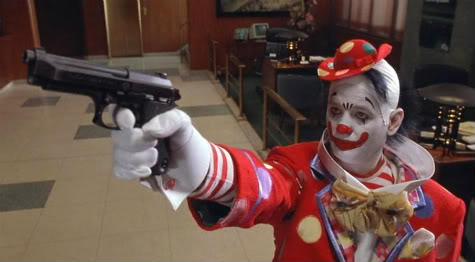
Octafish
(55,745 posts)It's a hilarious story if, ah, one's a Bankster.
Goldman Sachs Told It Was Getting 100 Cents On The Dollar From AIG, Top Exec Says
Shahien Nasiripour
HuffingtonPost, 06/27/2010
AIG and federal authorities did not negotiate with Goldman Sachs when it came to the firm's controversial $12.9 billion payout from AIG, courtesy of taxpayers, a top Goldman official told Senators today.
After the federal government stepped in to rescue the teetering insurance giant in the fall of 2008, the New York Fed, then led by current Treasury Secretary Timothy Geithner, directed AIG to pay its counterparties 100 cents on the dollar on their complex derivatives deals. More than $27 billion of taxpayer money went into the coffers of firms like Goldman Sachs and Deutsche Bank. The firms were also allowed to keep $35 billion in collateral previously posted by AIG.
Since AIG was under the control of taxpayers, it's been argued that more than $62 billion in taxpayer funds went to rescue Goldman and its peers in a series of transactions members of Congress have termed a "backdoor bailout."
The move has been heavily criticized by Democrats and Republicans alike, as well as by nonpartisan, independent federal investigators. The Office of the Special Inspector General for the Troubled Asset Relief Program issued a scathing report on the entire transaction, focusing on the role of federal regulators at the New York Fed who worked for Geithner.
SNIP...
"It was what they owed us," Viniar replied.
CONTINUED...
http://www.huffingtonpost.com/2010/04/27/goldman-sachs-told-it-was_n_554131.html
None of the clowns went to jail, which is really sad.
antigop
(12,778 posts)Octafish
(55,745 posts)By JOSH LEDERMAN
Associated Press June 29, 2015
EXCERPT...
"There's no one in the administration or in D.C. that's contemplating a federal bailout of Puerto Rico," Earnest said. "But we do remain committed to working with Puerto Rico and their leaders as they address the serious challenges."
Earnest said the Treasury Department is working with Puerto Rican officials to offer advice, and that an interagency task force would help the island identify federal programs and funds it might be able to tap into. He described that assistance as similar to what the federal government offered Detroit during its crisis. The Obama administration declined to offer Detroit a bailout, and the city declared bankruptcy under Chapter 9 of the Bankruptcy Code in 2013.
As a U.S. territory, Puerto Rico can't file for bankruptcy under that chapter, which is limited to municipalities such as Detroit. But Puerto Rican Gov. Alejandro Garcia Padilla has said he's considering asking Congress to change the law so that Puerto Rico's public agencies could declare bankruptcy under Chapter 9 — an idea that seemed to gain traction at the White House.
Earnest said the White House was encouraging Congress to explore possibilities to allow Puerto Rico to make use of Chapter 9, which would allow the commonwealth to restructure its debt amid a nearly decade-long economic slump. Garcia is seeking to defer debt payments while Puerto Rico negotiates with its creditors.
CONTINUED...
http://www.usnews.com/news/business/articles/2015/06/29/white-house-no-federal-bailout-for-puerto-rico
Brown people! Who needs 'em? Except for cannon fodder and mopes to bailout the Banksters, of course. Just like Detroit.
joshcryer
(62,536 posts)Elizabeth Warren.
Good luck getting transcripts of "conversations with Panel staff." If they even exist.
Octafish
(55,745 posts)Barofsky was the Inspector General for TARP. He explained how things really work.
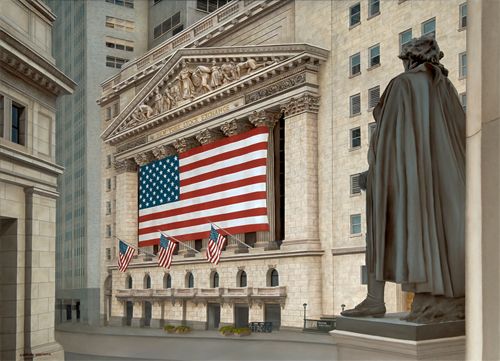
Neil Barofsky Gave Us The Best Explanation For Washington's Dysfunction We've Ever Heard
Linette Lopez
Business Insider, Aug. 1, 2012, 2:57 PM
Neil Barofsky was the Inspector General for TARP, and just wrote a book about his time in D.C. called Bailout: An Insider Account of How Washington Abandoned Main Street While Rescuing Wall Street.
SNIP...
Bottom line: Barofsky said the incentive structure in our nation's capitol is all wrong. There's a revolving door between bureaucrats in Washington and Wall Street banks, and politicians just want to keep their jobs.
For regulators it's something like this:
"You can play ball and good things can happen to you get a big pot of gold at the end of the Wall Street rainbow or you can do your job be aggressive and face personal ruin...We really need to rethink how we govern and how regulate," Barofsky said.
CONTINUED... http://www.businessinsider.com/neil-barofsky-2012-8
"Integrity is for paupers." -- traditional saying, ABCNNBCBSFixedNoiseNutworks
joshcryer
(62,536 posts)As are all enforcement arms of any agencies. In particular, the SEC is neutered to hell and back.
COP is where the real cronyism happened and Elizabeth Warren led it. It's no wonder the oversight papers are all nearly impossible to find, they didn't want anyone to drudge it back up. Politically it was the perfect cover. Put a liberal in charge of TARP, let said liberal talk a lot on CSPAN, and watch gleefully as the reports come out and there's nothing in them that shows how the bureaucracy provides a shield.
If TARP oversight spent even a 10th of the $20 million it had at its disposal actually accounting for each and every buyout, each and every severance pay, each and every reassigned employee, it would've had a much more profound effect.
But perhaps Barofsky is correct, personal ruin can be a compelling reason to let the system continue marching on.
Response to joshcryer (Reply #18)
brentspeak This message was self-deleted by its author.
joshcryer
(62,536 posts)Yes, Elizabeth Warren said TARP was necessary, and when she oversaw it she justified many many decisions being made as "conversations with Panel staff." No such transcripts exist.
How you can attribute to me some claim of hypocrisy against Warren is utterly laughable and patently dishonest. She can be for TARP and against the bankers getting paid bonuses, for example. She can be for TARP and for using it to break up the banks, as another example. These are not mutually exclusive things.
What she did while she oversaw it was lackluster and helped contribute to the problem we have now. By failing to spend the COP money in a way to show how utterly insane TARP was, no one batted an eye.
And since you were insulting to me for no reason whatsoever, saying it "sounds like I get my talking points from Breitbart.com," welcome to ignore.
Response to joshcryer (Reply #30)
brentspeak This message was self-deleted by its author.
WDIM
(1,662 posts)Those banks are owned by billionaires with plenty of money and the media created a false panic so Bush could give his bankster friends a huge bonus before he left office.
We should of let the banks fail and bailed out the people. But because our Government is corporate owned they paid their bosses.
All people that have a loan or debt should refuse to pay. The billionaires have enough money already.
Octafish
(55,745 posts)The Sting
In the best rip-off, the mark never knows that he or she was set up for fleecing.
In the case of the great financial meltdown of 2008, the victim is the U.S. taxpayer.
Going by the lack of analysis in Corporate McPravda, We the People are in for a royal fleecing.
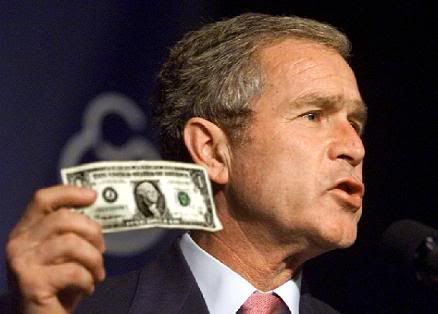
Don’t just take my word about the current situation between giant criminality and the politically connected.
[font color="green"][font size="5"]You see, there is evidence of conspiracy. An honest FBI agent warned us in 2004 about the coming financial meltdown and the powers-that-be stiffed him, too.[/font size][/font color]
The story’s below. And it’s not fiction. It is true to life.
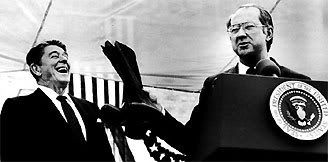
The Set-Up
You don’t have to be a fan of Paul Newman or Robert Redford to smell a BFEE rat. The oily critter’s name is Gramm. Phil Gramm. He helped Ronald Reagan push through his trickle-down fiscal policy and later helped de-regulate the nation's once-healthy Saving & Loan industry. We all know how well that worked out: Know your BFEE: They Looted Your Nation’s S&Ls for Power and Profit.
In 1999, then-super conservative Texas U.S. Senator Gramm helped pass the Gramm-Leach-Bliley Financial Services Modernization Act. This law allowed banks to act like investment houses. Using federally-guaranteed savings accounts, banks now could make risky commercial and real-estate loans.
The law should’ve been called the Gramm-Lansky Act. To those who gave a damn, it was obviously a potential disaster. During the bill’s debate, the specter of a “taxpayer bail-out” was raised by Sen. Byron Dorgan of North Dakota, warning about what had happened to the deregulated S&Ls.
Gramm wasn’t alone on the deregulation bandwagon. The law passed, IIRC, like 89-9. More than a few of my own Democratic faves went along with this deregulation, “get-government-off-the-back-of-business” law.
Today we have their love child, MOAB—for the Mother Of All Bailouts.

The Mark
In a sting, someone has to supply the money to be ripped off. Crooks call that person the mark or target or mope. In the present case, that’s the U.S. taxpayer.
Today’s financial crisis seems like a re-run of what happened to the Savings & Loans industry in the late 1980s. Well it is a lot like what happened to the S&Ls. Then, as now, it’s the U.S. taxpayer who gets to pick up the tab for someone else’s party.
Don’t worry, U.S. taxpayer. You’re getting something (among several things) for your $700 billion. You’re getting all the bad mortgage-based paper on almost all of Wall Street. I’d rather have penny stocks, because if there ever was something of negative value it’s the complicated notes and derivatives based on this mortgage debt.
When it comes to Bush economic policy, left holding the bag are We the People, er, Mopes. Don’t worry, it can’t get worse. As St. Ronnie would say, “Well. Yes.” You see, what the bag U.S. taxpayers hold is less than empty. It’s filled with bad debt.
The Mastermind
Chief economist amongst these merry band of thieves and traitors was one Phil Gramm (once a conservative Democrat and then an ultraconservative Republican-Taxus). An economist by training and reputation, Gramm was one of the guiding lights of Reaganomics, the cut taxes, domestic spending, and regulations while raising defense-spending to new heights. In sum, it was a fiscal policy to enrich friends – especially the kind connected to the BFEE.
Foreclosure Phil
Years before Phil Gramm was a McCain campaign adviser and a lobbyist for a Swiss bank at the center of the housing credit crisis, he pulled a sly maneuver in the Senate that helped create today's subprime meltdown.
David Corn
MotherJones.com
May 28, 2008
Who's to blame for the biggest financial catastrophe of our time? There are plenty of culprits, but one candidate for lead perp is former Sen. Phil Gramm. Eight years ago, as part of a decades-long anti-regulatory crusade, Gramm pulled a sly legislative maneuver that greased the way to the multibillion-dollar subprime meltdown. Yet has Gramm been banished from the corridors of power? Reviled as the villain who bankrupted Middle America? Hardly. Now a well-paid executive at a Swiss bank, Gramm cochairs Sen. John McCain's presidential campaign and advises the Republican candidate on economic matters. He's been mentioned as a possible Treasury secretary should McCain win. That's right: A guy who helped screw up the global financial system could end up in charge of US economic policy. Talk about a market failure.
Gramm's long been a handmaiden to Big Finance. In the 1990s, as chairman of the Senate banking committee, he routinely turned down Securities and Exchange Commission chairman Arthur Levitt's requests for more money to police Wall Street; during this period, the sec's workload shot up 80 percent, but its staff grew only 20 percent. Gramm also opposed an sec rule that would have prohibited accounting firms from getting too close to the companies they audited—at one point, according to Levitt's memoir, he warned the sec chairman that if the commission adopted the rule, its funding would be cut. And in 1999, Gramm pushed through a historic banking deregulation bill that decimated Depression-era firewalls between commercial banks, investment banks, insurance companies, and securities firms—setting off a wave of merger mania.
But Gramm's most cunning coup on behalf of his friends in the financial services industry—friends who gave him millions over his 24-year congressional career—came on December 15, 2000. It was an especially tense time in Washington. Only two days earlier, the Supreme Court had issued its decision on Bush v. Gore. President Bill Clinton and the Republican-controlled Congress were locked in a budget showdown. It was the perfect moment for a wily senator to game the system. As Congress and the White House were hurriedly hammering out a $384-billion omnibus spending bill, Gramm slipped in a 262-page measure called the Commodity Futures Modernization Act. Written with the help of financial industry lobbyists and cosponsored by Senator Richard Lugar (R-Ind.), the chairman of the agriculture committee, the measure had been considered dead—even by Gramm. Few lawmakers had either the opportunity or inclination to read the version of the bill Gramm inserted. "Nobody in either chamber had any knowledge of what was going on or what was in it," says a congressional aide familiar with the bill's history.
It's not exactly like Gramm hid his handiwork—far from it. The balding and bespectacled Texan strode onto the Senate floor to hail the act's inclusion into the must-pass budget package. But only an expert, or a lobbyist, could have followed what Gramm was saying. The act, he declared, would ensure that neither the sec nor the Commodity Futures Trading Commission (cftc) got into the business of regulating newfangled financial products called swaps—and would thus "protect financial institutions from overregulation" and "position our financial services industries to be world leaders into the new century."
Subprime 1-2-3
Don't understand credit default swaps? Don't worry—neither does Congress. Herewith, a step-by-step outline of the subprime risk betting game. —Casey Miner
CONTINUED…
http://www.motherjones.com/news/feature/2008/07/foreclo...
A fine mind for modern Bushonomics. Kill the middle class. Then, rob from the poor to give to the rich.
The Mentor
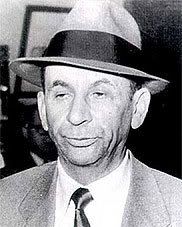
Anyone who’s ever heard him talk knows that Gramm must’ve learned all this stuff from somebody. He could never think it all up on his own. He had to have help. That’s where Meyer Lansky, the man who brought modern finance to the Mafia, comes in.
Money Laundering
Answers.com
EXCERPT...
History
Modern development
The act of "money laundering" was not invented during the Prohibition era in the United States, but many techniques were developed and refined then. Many methods were devised to disguise the origins of money generated by the sale of then-illegal alcoholic beverages. Following Al Capone's 1931 conviction for tax evasion, mobster Meyer Lansky transferred funds from Florida "carpet joints" (small casinos) to accounts overseas. After the 1934 Swiss Banking Act, which created the principle of bank secrecy, Meyer Lansky bought a Swiss bank to which he would transfer his illegal funds through a complex system of shell companies, holding companies, and offshore accounts.(1)
The term "money laundering" does not derive, as is often said, from Al Capone having used laundromats to hide ill-gotten gains. It was Meyer Lansky who perfected money laundering's older brother, "capital flight," transferring his funds to Switzerland and other offshore places. The first reference to the term "money laundering" itself actually appears during the Watergate scandal. US President Richard Nixon's "Committee to Re-elect the President" moved illegal campaign contributions to Mexico, then brought the money back through a company in Miami. It was Britain's Guardian newspaper that coined the term, referring to the process as "laundering."
Process
Money laundering is often described as occurring in three stages: placement, layering, and integration.(3)
Placement: refers to the initial point of entry for funds derived from criminal activities.
Layering: refers to the creation of complex networks of transactions which attempt to obscure the link between the initial entry point, and the end of the laundering cycle.
Integration: refers to the return of funds to the legitimate economy for later extraction.
However, The Anti Money Laundering Network recommends the terms
Hide: to reflect the fact that cash is often introduced to the economy via commercial concerns which may knowingly or not knowingly be part of the laundering scheme, and it is these which ultimately prove to be the interface between the criminal and the financial sector
Move: clearly explains that the money launderer uses transfers, sales and purchase of assets, and changes the shape and size of the lump of money so as to obfuscate the trail between money and crime or money and criminal.
Invest: the criminal spends the money: he/she may invest it in assets, or in his/her lifestyle.
CONTINUED...
http://www.answers.com/topic/money-laundering
The great journalist Lucy Komisar has shone a big light on the subject:
Offshore Banking
The U.S.A.’s Secret Threat
Lucy Komisar
The Blacklisted Journalist
June 1, 2003
EXCERPT…
In 1932, mobster Meyer Lansky took money from New Orleans slot machines and shifted it to accounts overseas. The Swiss secrecy law two years later assured him of G-man-proof banking. Later, he bought a Swiss bank and for years deposited his Havana casino take in Miami accounts, then wired the funds to Switzerland via a network of shell and holding companies and offshore accounts, some of them in banks whose officials knew very well they were working for criminals. By the 1950s, Lansky was using the system for cash from the heroin trade.
Today, offshore is where most of the world's drug money is laundered, estimated at up to $500 billion a year, more than the total income of the world's poorest 20 percent. Add the proceeds of tax evasion and the figure skyrockets to $1 trillion. Another few hundred billion come from fraud and corruption.
Lansky laundered money so he could pay taxes and legitimate his spoils. About half the users of offshore have opposite goals. As hotel owner and tax cheat Leona Helmsley said---according to her former housekeeper during Helmsley's trial for tax evasion---"Only the little people pay taxes." Rich individuals and corporations avoid taxes through complex, accountant-aided schemes that routinely use offshore accounts and companies to hide income and manufacture deductions.
The impact is massive. The IRS estimates that taxpayers fail to pay in excess of $100 billion in taxes annually due on income from legal sources. The General Accounting Office says that American wage-earners report 97 percent of their wages, while self-employed persons report just 11 percent of theirs. Each year between 1989 and 1995, a majority of corporations, both foreign- and U.S.-controlled, paid no U.S. income tax. European governments are fighting the same problem. The situation is even worse in developing countries.
The issue surfaces in the press when an accounting scam is so outrageous that it strains credulity. Take the case of Stanley Works, which announced a "move" of its headquarters-on paper-from New Britain, Connecticut, to Bermuda and of its imaginary management to Barbados. Though its building and staff would actually stay put, manufacturing hammers and wrenches, Stanley Works would no longer pay taxes on profits from international trade. The Securities and Exchange Commission, run by Harvey Pitt---an attorney who for more than twenty years represented the top accounting and Wall Street firms he was regulating---accepted the pretense as legal.
"The whole business is a sham," fumed New York District Attorney Robert Morgenthau, who more than any other U.S. law enforcer has attacked the offshore system. "The headquarters will be in a country where that company is not permitted to do business. They're saying a company is managed in Barbados when there's one meeting there a year. In the prospectus, they say legally controlled and managed in Barbados. If they took out the word legally, it would be a fraud. But Barbadian law says it's legal, so it's legal." The conceit apparently also persuaded the Securities and Exchange Commission.
CONTINUED…
http://www.bigmagic.com/pages/blackj/column92e.html
Socialize the risk for Wall Street. Privatize the loss to Uncle Sam’s nieces and nephews. Congratulations, Dear Reader! Now you know as much as Phil Gramm.
The Diversion
Still, a global financial meltdown sounds like something bad. Making things worse, we’re hearing that Uncle Sam is broke! Flat busted. Tapped out.
That’s odd, though. We the People see the Treasury being emptied with tax breaks for the wealthy and checks to the companies they own that make money off of war. Want to know how to make a buck these days? Invest in the likes of Halliburton and Northrup Grumman. Anything in the warmongering business connected to Bush and his cronies will weather the downturn or depression.
The Wall Street Journal -- a paper owned and operated by Fox News’ head, Rupert Murdoch – was very quick to promote the crisis, as DUer JustPlainKathy observed. The paper was even faster to pounce on a solution: What’s needed is a safety net for banks. And quick as a wink, they found the answer!
Only the U.S. taxpayer has the wherewithal to prevent the collapse of the global financial system -- a global economic meltdown that would freeze up credit and investment and expansion and prosperity and a return to the Great Depression. Who can be against that?
Oh. Kay. Sounds about right – Rupert the Alien agreeing with what Leona Helmsley said: “Only the little people pay taxes.”
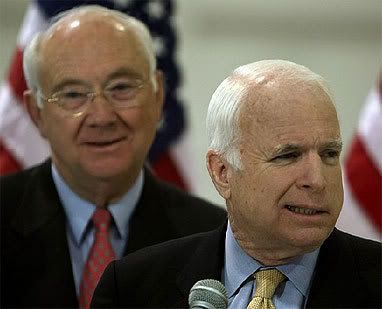
Gramm and McCain also are in favor of privatization. How nice is that?
The Getaway
George Walker Bush and his right-wing pals feel they can get away with this, their latest rip-off the American taxpayers. Who can blame them? When compared to their clear record of incompetence, lies, fraud, theft, mass-murder, warmongering and treason, what’s a few trillion dollar rip-off?

Still, it's weird how they act.
They must really think they’ll be welcomed with open arms in Paraguay and Dubai and Switzerland.
Going by the welcome the world gave the Shah of Iran, they’re in for a big surprise.
The FBI Guy
Don’t say we weren’t warned. An intrepid FBI agent with something sorely lacking in the rest of the Bush administration, integrity, blew the whistle on the bank thing…
FBI saw threat of mortgage crisis
A top official warned of widening loan fraud in 2004, but the agency focused its resources elsewhere.
By Richard B. Schmitt
Los Angeles Times Staff Writer
August 25, 2008
WASHINGTON — Long before the mortgage crisis began rocking Main Street and Wall Street, a top FBI official made a chilling, if little-noticed, prediction: The booming mortgage business, fueled by low interest rates and soaring home values, was starting to attract shady operators and billions in losses were possible.
"It has the potential to be an epidemic," Chris Swecker, the FBI official in charge of criminal investigations, told reporters in September 2004. But, he added reassuringly, the FBI was on the case. "We think we can prevent a problem that could have as much impact as the S&L crisis," he said.
Today, the damage from the global mortgage meltdown has more than matched that of the savings-and-loan bailouts of the 1980s and early 1990s. By some estimates, it has made that costly debacle look like chump change. But it's also clear that the FBI failed to avert a problem it had accurately forecast.
Banks and brokerages have written down more than $300 billion of mortgage-backed securities and other risky investments in the last year or so as homeowner defaults leaped and weakness in the real estate market spread.
SNIP…
Most observers have declared the mess a gross failure of regulation. To be sure, in the run-up to the crisis, market-oriented federal regulators bragged about their hands-off treatment of banks and other savings institutions and their executives. But it wasn't just regulators who were looking the other way. The FBI and its parent agency, the Justice Department, are supposed to act as the cops on the beat for potentially illegal activities by bankers and others. But they were focused on national security and other priorities, and paid scant attention to white-collar crimes that may have contributed to the lending and securities debacle.
Now that the problems are out in the open, the government's response strikes some veteran regulators as too little, too late.
Swecker, who retired from the FBI in 2006, declined to comment for this article.
But sources familiar with the FBI budget process, who were not authorized to speak publicly about the growing fraud problem, say that he and other FBI criminal investigators sought additional assistance to take on the mortgage scoundrels.
They ended up with fewer resources, rather than more.
CONTINUED…
http://www.latimes.com/business/la-fi-mortgagefraud25-2008aug25,0,6946937.story
We were warned and nothing happened.
Repeat: And nothing happened.
They must think We the People are really stupid. Are we supposed to believe that all that $700 billion in bad debt just happened? Where did all that money go? Who got all the money?
Meyer Lansky moved the Mafia’s money from the Cuban casinos to Switzerland. He did so by buying a bank in Miami. Phil Gramm seems to have done the same thing as vice-chairman of UBS, except the amounts are in the billions.
Who cares? He’s almost gone? Nope. That money still exists somewhere. I have a pretty good idea of where it might be. And George Bush and his cronies are poised to get away with a whole lot of loot.
Who Should Pay for the Bailout
If you are fortunate enough to be one, good luck American taxpayer! You’re in for a royal fleecing. Once the interest is figured into the bailout, we’re looking at a couple of trill.
The people who should pay for the bailout aren’t the American people. That distinction should go to the crooks who stole it -- friends of Gramm like John McCain and George Bush and the rest of the Raygunomix crowd of snake-oil salesmen. For them, the Bush administration -- and a good chunk of time since Ronald Reagan -- has not been a disaster. It’s been a cash cow.
The above was posted on DU on Sept. 21, 2008. (Check out the responses, lots of info from DUers.) What's changed since then? Nothing near what We the People interested in Justice would have hoped for, certainly.
http://www.democraticunderground.com/discuss/duboard.php?az=view_all&address=389x4055207
WDIM
(1,662 posts)And until we stop sending them money they will continue their crime wave.
Every bankster that received money from the bailout should have their assets seized and redistributed to the people.
Baitball Blogger
(51,905 posts)if we didn't bail out those banks? Can you imagine what would happen to those young twenty-somethings who don't have the surplus money from bank or bond company bonus checks to purchase divey bars on the harbor, where they can continue a life-style among their peers until they're well into their thirties?
I am dismayed that you just don't get it.
(Is the sarcasm label really needed on this one?)
Octafish
(55,745 posts)I'm all in favor of helping a person in need, but really...
The Real Housewives of Wall Street
Why is the Federal Reserve forking over $220 million in bailout money to the wives of two Morgan Stanley bigwigs?
By Matt Taibbi
April 12, 2011 9:55 AM ET
EXCERPT...
But if you want to get a true sense of what the "shadow budget" is all about, all you have to do is look closely at the taxpayer money handed over to a single company that goes by a seemingly innocuous name: Waterfall TALF Opportunity. At first glance, Waterfall's haul doesn't seem all that huge — just nine loans totaling some $220 million, made through a Fed bailout program. That doesn't seem like a whole lot, considering that Goldman Sachs alone received roughly $800 billion in loans from the Fed. But upon closer inspection, Waterfall TALF Opportunity boasts a couple of interesting names among its chief investors: Christy Mack and Susan Karches.
Christy is the wife of John Mack, the chairman of Morgan Stanley. Susan is the widow of Peter Karches, a close friend of the Macks who served as president of Morgan Stanley's investment-banking division. Neither woman appears to have any serious history in business, apart from a few philanthropic experiences. Yet the Federal Reserve handed them both low-interest loans of nearly a quarter of a billion dollars through a complicated bailout program that virtually guaranteed them millions in risk-free income.
SNIP...
In the case of Waterfall TALF Opportunity, here's what we know: The company was founded in June 2009 with $14.87 million of investment capital, money that likely came from Christy Mack and Susan Karches. The two Wall Street wives then used the $220 million they got from the Fed to buy up a bunch of securities, including a large pool of commercial mortgages managed by Credit Suisse, a company John Mack once headed. Those securities were valued at $253.6 million, though the Fed refuses to explain how it arrived at that estimate. And here's the kicker: Of the $220 million the two wives got from the Fed, roughly $150 million had not been paid back as of last fall — meaning that you and I are still on the hook for most of whatever the Wall Street spouses bought on their government-funded shopping spree.
The public has no way of knowing how much Christy Mack and Susan Karches earned on these transactions, because the Fed has repeatedly declined to provide any information about how it priced the individual securities bought as part of programs like TALF. In the Waterfall deal, for instance, we know the Fed pledged some $14 million against a block of securities called "Credit Suisse Commercial Mortgage Trust Series 2007-C2" — but that data is meaningless without knowing how many units were bought. It's like saying the Fed gave Waterfall $14 million to buy cars. Did Waterfall pay $5,000 per car, or $500,000? We have no idea. "There's no way of validating or invalidating the Fed's process in TALF without this pricing information," says Gary Aguirre, a former SEC official who was fired years ago after he tried to interview John Mack in an insider-trading case.
In early April, in an attempt to learn exactly how much Mack and Karches made on the TALF deals, Sen. Chuck Grassley of Iowa wrote a letter to Waterfall asking 21 detailed questions about the transactions. In addition, Sen. Sanders has personally asked Fed chief Bernanke to provide more complete information on the TALF loans given not only to Christy Mack but to gazillionaires like former Miami Dolphins owner H. Wayne Huizenga and hedge-fund shark John Paulson. But Bernanke bluntly refused to provide the information — and the Fed has similarly stonewalled other oversight agencies, including the General Accounting Office and TARP's special inspector general.
CONTINUED...
http://www.rollingstone.com/politics/news/the-real-housewives-of-wall-street-look-whos-cashing-in-on-the-bailout-20110411
I can understand how the French skipped due process back in 1789. There were no shortage of volunteers to power the tumbrils.
Baitball Blogger
(51,905 posts)You just have to break bread with them to understand just how profitable it is to live near Wall Street. When I proudly told them that my son got a job for X amount on his own in Georgia, they responded, "Is that all?"
Now that I understand what is happening to the tech business with outside competition, I get it.
Octafish
(55,745 posts)When I rub elbows with such, I am amazed at how little they know of work or a life well lived.
I have a good friend who's an investment guru. He described the common fear his clients have -- mostly trust fund kids who are now grown -- is their money running out. It's as if they can't figure out how to get more. Their fears and concerns are understand as most have never worked a day in their lives.
randome
(34,845 posts)What would it be like to let a bank fail? Giving depositors' and creditors' money to some other bank? Granted, that occurs if a bank goes under but that's a rare occurrence.
I'm not saying that banks trump everything else, just throwing a thought out there, assuming, of course, that the question asked in the subject line is one fishing for information.
Prosecuting those responsible for a bank's financial irregularities is something I'm in favor of but the laws get so complicated, it's often difficult to say who did what, and whether or not there was malice involved.
[hr][font color="blue"][center]"There is a crack in everything. That's how the light gets in."
Leonard Cohen, Anthem (1992)[/center][/font][hr]
WDIM
(1,662 posts)The Government should of used the 700 BILLION dollars to buy the people who were losing their homes mortgages and given the people their homes free and clear.
This would of gave money to the banks not that they were having any problems anyway they are owned by billionaires.
Instead we gave the banks handout and the banks foreclosed on thousands of homes amd ruined thousands of lives.
It was pure criminal extortion of the American people.
pnwmom
(110,219 posts)Why should they get their homes free and clear while other people lose their bank deposits?
WDIM
(1,662 posts)pnwmom
(110,219 posts)while someone with their life savings in a bank could lose anything over the insured limit?
every cent of the $700b was repaid. The Treasury made a profit too.
If the government gives away houses, will it be repaid?
WDIM
(1,662 posts)Maybe i was too hasty saying to give them the house free amd clear but atleast they should of brought all the delinquent loans current. And stopped all foreclosures from banks that were getting the tax payer handout.
2naSalit
(101,040 posts)to destroy democracy, it seems to be going swimmingly so far.
Big, fat K&R!!!
![]()
djean111
(14,255 posts)generations of people - but it is the banks that control things. The 1%. The curtain slipped a bit when Jamie Dimon was whipping votes for Obama. Dimon was actually whipping votes for himself and his buddies.
Octafish
(55,745 posts)"When I was young I thought that money was the most important thing in life; now that I am old I know that it is." -- Oscar Wilde

PS: I don't agree, exactly. I think -- and I believe it's how you see things, djean111 -- people are more important than things, including all the money in the world.
djean111
(14,255 posts)play, not just to win, but to win and inflict harm. And they are pretty triumphant right now.
Octafish
(55,745 posts)His predecessor's criminality deserved investigation and prosecution.
''Money trumps peace," said pretzeldent George W Bush on Feb. 14, 2007, words uttered at a press conference in which not a single of the callow, cowed press corpse saw fit to ask a follow-up. And then the mass murderer and traitor who lied America into war abroad and corrupt policies at home giggled.
Gold Star mom Cindy Sheehan tried to bring it to our nation's attention. Few others, if anyone, saw fit to comment.
As for where American's entrepreneurial spirit of war came from: Poppy: Bush Sr told the FBI he was in Dallas on Nov. 22, 1963. And "Money trumps peace" continues, unabated.
Agnosticsherbet
(11,619 posts)Banks could be regulated, to make them more fair.
They could be nationalized into one central bank controlled by the government.
We could devise another system to keep cash moving through the markets and to the people, I suppose. (I am not an economist, but I imagine we could do that.)
But they are necessary, and when they begin collapsing like drunks at the end of a binge, the economy spirals around the drain.
WDIM
(1,662 posts)2008 would of been a perfect opportunity to start a new system of national banks that work for and not against the people.
Instead they got the media to create a huge panic and Bush got the bonus he wanted for his Bankster friends.
Then the banks foreclosed on countless families and ruined countless lives. And the banks continue their extortion to this day.
Agnosticsherbet
(11,619 posts)We could not even break them up so that a bank failure was not a shot to the head.
Political will means everything at times like those.
WDIM
(1,662 posts)JEB
(4,748 posts)Octafish posts the most informative and thoughtful op's and threads. Thanks for all your work. It's why I come here.
KingCharlemagne
(7,908 posts)ancianita
(43,162 posts)bobthedrummer
(26,083 posts)Banksters USA (The Center for Media and Democracy/CMD)
http://www.prwatch.org/topics/banksterusa
K&R.
PufPuf23
(9,725 posts)for those "entitled".
Hoyt
(54,770 posts)It can affect a lot of "people," besides just the rich.
